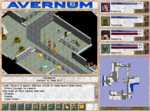Front page
Archive
Home
Norske blogger
NTB
AP
RFE/RL
Drudge Report
Aftenposten
Nettavisen
Adresseavisen
Norlandsposten
Bergens Tidende
Sprøytvarsleren
Odin
Aftonbladet
Jyllands-Posten
Berlingske Tidende
Ha'Aretz
Mideast Realities
The Age
The Independent
Moscow Times
Transition
Central Europe Review
National Review
The Register
Kuro5hin
Arts and Letters
Threepwood '01 is maintained by Beorn aka Bjørn Stærk,
a norwegian nerd with nothing better to do.
Friendly mail is welcome at
staerk@fix.no
Sinfest
Sluggy Freelance
Red Meat
Pondus
Boondocks
Exploitation Now
explodingdog
Scott McCloud
Electric Sheep
Need To Know
Suck
The Filthy Critic
Old Man Murray
BBSpot
Modern Humorist
Jetzet
NakedNews
AudioGalaxy
AMD All Music Guide
LikeTelevision
Kristok
Altavista Images
Toppidretten gj�r nordmenn mer nasjonalistiske og sj�vinistiske, alts� den strake motsetning til det som for eksempel er nedfelt i det olympiske charter. Idretten skal jo i utgangspunktet redusere nasjonalisme og v�re en motvekt mot rasisme. Det symboliseres blant annet av de fem olympiske ringer. Gro Harlem Brundtland sa etter OL i Albertville at det er typisk norsk � v�re god. Jeg vil si at det er typisk norsk � v�re sj�lgod.
Trust the party-poopers at Dagsavisen to celebrate Easter by digging up some random third-rate academic who can reveal yet another social issue to be Deeply Concerned about, in this case pride in sports champions or whatever. For all I know it's taken out of context, but I'd like to comment on their idea of what the purpose of sport is. The implication here is that sports ought to be an active tool against nationalism and racism, and I think that is a completely wrong perspective to take.
 If you map sports onto a political scale, you will always end up with a
very ugly ideology. The best presentation of olympic
ideals I've ever seen is Olympia by Leni Riefenstahl,
a documentary / propaganda movie from the 1936 Berlin olympics. I'd never before been fascinated
by linear sports like running, skiing, jumping or throwing - linear in the sense that the results can be measured on a straight linear scale,
if you run faster than the competitors you win. To me that seemed very pointless and boring. I didn't get it until I
watched Olympia. There's something about the way it is filmed that makes Olympia a powerful statement about
the aspirations of humanity: Higher, faster, stronger. You have one scene where two runners are shown side by side,
and slowly, step by step, one moves ahead of the other, and it is beautiful. There's also the opening scene, where
ancient greek statues in misty ruins creates a link to the past, underscoring how the struggles of modern-day athletes
is only the latest step in the eternal struggle of human civilization. (If you have broadband, go
watch the movie at
LikeTelevision.)
If you map sports onto a political scale, you will always end up with a
very ugly ideology. The best presentation of olympic
ideals I've ever seen is Olympia by Leni Riefenstahl,
a documentary / propaganda movie from the 1936 Berlin olympics. I'd never before been fascinated
by linear sports like running, skiing, jumping or throwing - linear in the sense that the results can be measured on a straight linear scale,
if you run faster than the competitors you win. To me that seemed very pointless and boring. I didn't get it until I
watched Olympia. There's something about the way it is filmed that makes Olympia a powerful statement about
the aspirations of humanity: Higher, faster, stronger. You have one scene where two runners are shown side by side,
and slowly, step by step, one moves ahead of the other, and it is beautiful. There's also the opening scene, where
ancient greek statues in misty ruins creates a link to the past, underscoring how the struggles of modern-day athletes
is only the latest step in the eternal struggle of human civilization. (If you have broadband, go
watch the movie at
LikeTelevision.)
And clearly, when you map these athletic values (higher, faster, stronger) onto politics, you get an ideology like nazism, where these athletic super-humans are not only better runners, but better humans. Nazism brought olympic ideals into real life, there was no contradiction, they're two sides of the same coin, one imaginary and the other real. The same is true for non-linear sports like soccer and hockey, (non-linear in the sense that the whole game is chaotic, every single time the ball is touched, the outcome of the match is changed.) Most sports and games looks pretty ugly when mapped onto politics: you get social darwinism, war, imperialism, nationalism. There are many political analogies for what goes on on a soccer field, and none of them democratic.
 Does this mean sports is dangerous?
That depends on which of two very basic, very different worldviews you subscribe to.
One, popular among christians and socialists, holds that art and entertainment are guides to follow,
inspiring or seducing those who watch it, and therefore should be held to the same moral standards as other guides.
According to this worldview, watching too much sports will make you more nationalistic,
more xenophobic, and more aggressive, like watching violent movies will turn you into a killer.
The other, closer to mine, holds that art and entertainment are representations of and outlets for something
that already exists in human nature, a mirror that can never reveal anything that wasn't in you to begin with.
Cheering for your country's teams and athletes is then a safe outlet for an aggressive nationalist
instinct that in a previous age led to real wars with real people. The wars are gone for many of us, but human nature
hasn't changed, and so these same aggressive instincts are channeled into harmless entertainment like sports.
Does this mean sports is dangerous?
That depends on which of two very basic, very different worldviews you subscribe to.
One, popular among christians and socialists, holds that art and entertainment are guides to follow,
inspiring or seducing those who watch it, and therefore should be held to the same moral standards as other guides.
According to this worldview, watching too much sports will make you more nationalistic,
more xenophobic, and more aggressive, like watching violent movies will turn you into a killer.
The other, closer to mine, holds that art and entertainment are representations of and outlets for something
that already exists in human nature, a mirror that can never reveal anything that wasn't in you to begin with.
Cheering for your country's teams and athletes is then a safe outlet for an aggressive nationalist
instinct that in a previous age led to real wars with real people. The wars are gone for many of us, but human nature
hasn't changed, and so these same aggressive instincts are channeled into harmless entertainment like sports.
But no matter which view you hold, don't act surprised to find ugly political analogies in popular sports or art. It's all there, and it's so fundamental you have to be blind not to see it.
(I'm away for a few days now. Celebrate Easter by listening to something beautiful, like Bach's St. Matthew Passion.)
Posted 4/10/2001 by Beorn
 Jeff Vogel of Spiderweb Software makes shareware games
in the spirit of late 80's, early 90's RPG's.
I've heard a lot of good things about his games, but never really gave them a fair chance until this weekend, when I started
on Avernum 2. The graphics are on level
with the second Ultima trilogy, but I don't really care, all graphics become
transparent after a few hours of gameplay - that craving megahurtz-monster lurking deep inside most
nerds will never be pleased anyway, so it's best just to ignore him.
Jeff Vogel of Spiderweb Software makes shareware games
in the spirit of late 80's, early 90's RPG's.
I've heard a lot of good things about his games, but never really gave them a fair chance until this weekend, when I started
on Avernum 2. The graphics are on level
with the second Ultima trilogy, but I don't really care, all graphics become
transparent after a few hours of gameplay - that craving megahurtz-monster lurking deep inside most
nerds will never be pleased anyway, so it's best just to ignore him.
So far my impression is good. The user interface is excellent, with keyboard shortcuts speeding up tasks that easily become repetitive in fully mouse-oriented games, especially when the fighting is turn-based. The game relies completely on text to drive the storyline and set the atmosphere. This explains why Spiderweb's games never sell like Diablo 2, but also how a lone programmer can keep churning out full-sized RPG's year after year like this. Voice-acting and video is nice in a game, but when the budget is limited, there is nothing more efficient than pure text.
There is aboslutely no music either, and only a few sound effects, in my opinion a very good design choice besides saving the developer money. Most music gets boring after it has been repeated 400 times, so why not leave the background music for the player to choose? Honorable exception: Ultima 4 - 7 - guess what music I've been playing Avernum 2 to the last couple of days.
Jeff Vogels also has an interesting monthly column at CGO, where he elaborates some of his ideas of what makes a good computer game.
Posted 4/10/2001 by Beorn
First J@glandbrev, then
St@tsministerbrev, and now
J@! og
Si @!.
Somewhere, deep down in a forgotten corridor at a branch of government with nothing better to do, some bureaucrat with a brand new Word diploma
is feeling mighty clever right now for thinking up all these puns. I'd like to be there the day he's told how @ is really pronounced.
We are the knights who say .. at! at! at! at! at! at!
Posted 4/9/2001 by Beorn
First I read an article about immortality seekers in ancient China,
and what do you know, three hours later I happen to read a
Poul Anderson story inspired by the same tales, which I
never heard before. (A synchronicity I'm sure
taoists would appreciate more than the writer at Secular Web.)
Suppose there were perpetual copyright, and it was very broad. So if you�re making a movie you may have to find Homer�s heirs and negotiate a copyright license with them. If someone had a patent on the wheel, every time you built a truck you would have to get a license from the descendents of some caveman who thought up the wheel. If there is too much protection of intellectual property it�s stifling, and if there is too little it also stifles creativity.
Something like the Internet comes along, and on the one hand it makes it easier to steal, but on the other hand, by expanding the market for intellectual property, it also increases the returns. So how you figure out what the right approach is is baffling.
Libertarian and pragmatic judge Richard Posner not having any answers to copyright on the net, a very cowardly position to take, and about the only one I still respect. Oh, and he's a fellow Marx Brothers fan too! [From ALD.]
Posted 4/9/2001 by Beorn
First we forbid their opinions, then we send them off to reeducation camps.
(But don't worry, your opinions are still safe.)
Say, I could use a bit of reeducation myself. My faith in anti-racism is treacherously low, and it certainly isn't going to restore itself.
ORIGIN
We Created Worlds...
1983-2001
Richard Garriot at the wake for Origin a few weeks ago, after UO2, the last work in progress remotely connected with the company, was cancelled. The funeral pyre bears an odd resemblance to the moongates in Ultima.
Interestingly, Garriot reveals that he's now thinking about starting all over again, with some of the laid-off employers, - the first clue I've heard of his future plans since he left Origin last year.
And no matter what happens, we'll always have Paris, uh, I mean Serpent Isle. And the music, of course. Here are some midi files which may or may not sound good depending on your soundcard.

![[Get Opera]](/threepwood/operabutton.gif)